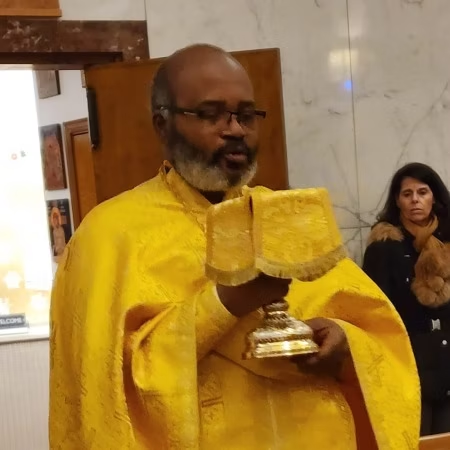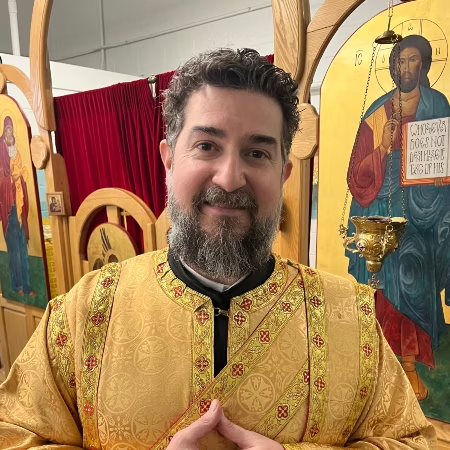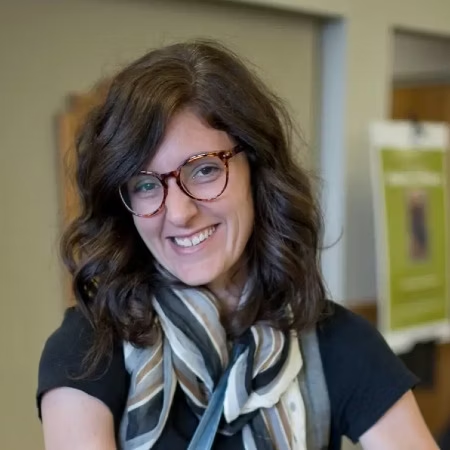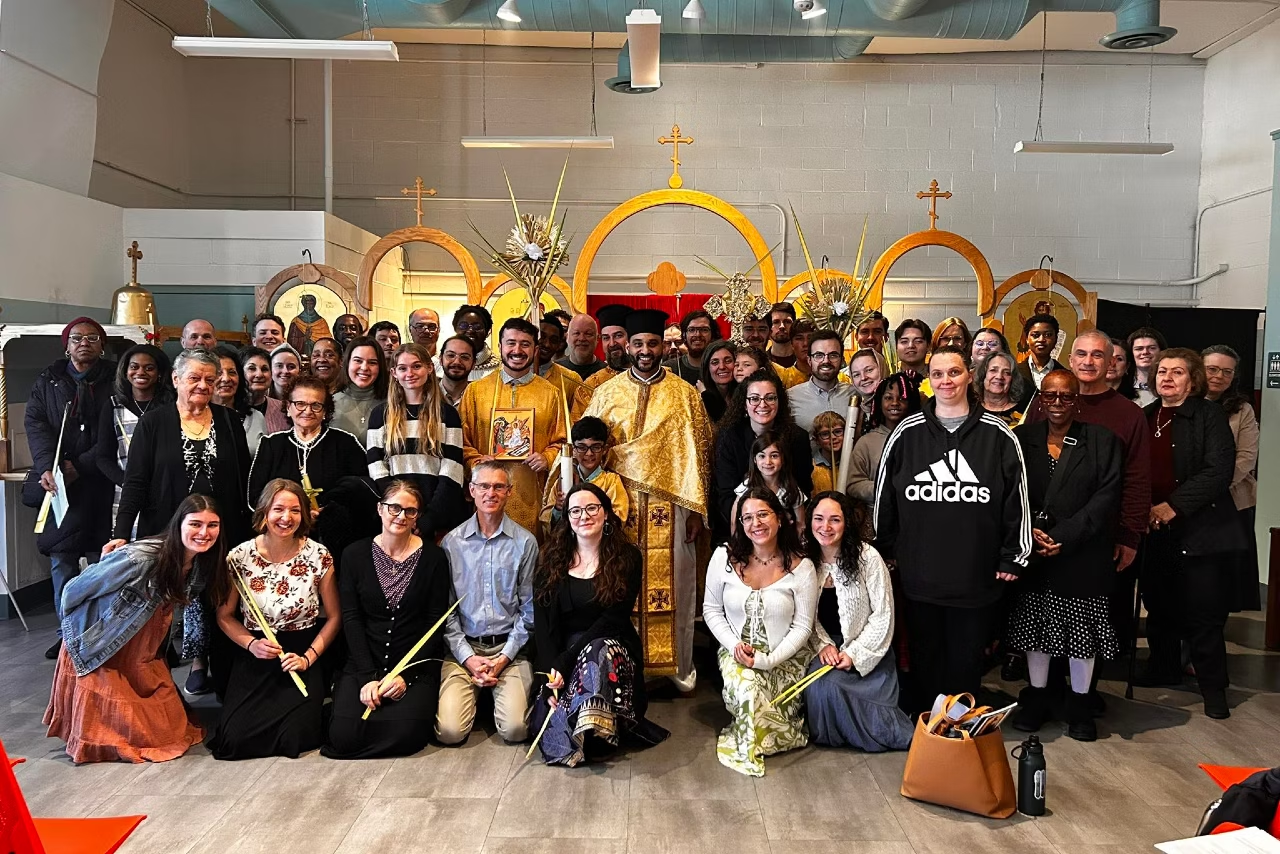Welcome
Welcome to ST. MOSES THE BLACK ORTHODOX CHURCH, a parish of the Antiochian Orthodox Christian Archdiocese of North America, located in the historical Hill District of Pittsburgh, PA.
Latest News
Service Times
Sundays
Mondays
Tuesdays
Wednesdays
Thursdays
Fridays
Saturdays
Clergy and Staff

Fr. Maximos Nnachette
Assistant Pastor

Dn. James Rossetti
Deacon
Pres. Kristina Abernathy
Presbytera

Sh. Karoline Rossetti
Shamassy

Andrea Danko-Barna
Pastoral Assistant
Our Beliefs
- Orthodox Church
- God the Father
- Jesus Christ
- Holy Spirit
- Mary
- Apostolic Succession
- Councils of the Church
- Creed
- The Bible
- Creation
- Sin
- Heaven
- Hell
- Salvation
- Justification
- Baptism
- Eucharist
- Worship
- Sanctification
- Confession
- Icons
- Prayer to the Saints
- Spiritual Gifts
- Second Coming
Orthodox Church
WHAT IS THE ORTHODOX CHURCH?
The Orthodox Church is the Church founded by Jesus Christ and described throughout the New Testament. All other Christian Churches and sects can be traced back historically to it. The word Orthodox literally means 'straight teaching' or 'straight worship,' being derived from two Greek words: orthos, 'straight,' and doxa, 'teaching' or 'worship.' As the encroachments of false teaching and division multiplied in early Christian times, threatening to obscure the identity and purity of the Church, the term 'Orthodox' quite logically came to be applied to it. The Orthodox Church carefully guards the truth against all error and schism, both to protect its flock and to glorify Christ, whose Body the Church is.
An astonishing number of religious groups today claim to be the successors of the early Church. A 'yardstick for truth' is needed by which to compare what the Church originally believed and practiced with what these groups proclaim. Certainly we all have the God-given right to believe whatever we desire and to participate in whatever religious association we choose. But it is also just good sense to be acquainted with the options before we make our final choices.
For a description of our beliefs click on the tabs on the left or visit the Antiochian Archdiocese's website at http://ww1.antiochian.org/whatorthodoxbelieve
God the Father
GOD THE FATHER is the fountainhead of the Holy Trinity. The Scriptures reveal that the one God is Three Persons-Father, Son, and Holy Spirit-eternally sharing the one divine nature. From the Father the Son is begotten before all ages and all time (Psalm 2:7; 2 Corinthians 11:31). It is also from the Father that the Holy Spirit eternally proceeds (John 15:26). Through Jesus Christ, and in the Holy Spirit, we come to know the Father (Matthew 11:27). God the Father created all things through the Son, in the Holy Spirit (Genesis 1; 2; John 1:3; Job 33:4), and we are called to worship Him (John 4:23). The Father loves us and sent His Son to give us everlasting life (John 3:16).
Jesus Christ
JESUS CHRIST is the Second Person of the Trinity, eternally born of the Father. He became a man, and thus He is at once fully God and fully man. His coming to earth was foretold in the Old Testament by the Prophets. Because Jesus Christ is at the heart of Christianity, the Orthodox Church has given more attention to knowing Him than to anything or anyone else.
In reciting the Nicene Creed, Orthodox Christians regularly affirm the historic faith concerning Jesus as they say,
'I believe . . . in one Lord Jesus Christ, begotten of the Father before all ages, Light of Light, Very God of Very God, begotten, not made, of one essence with the Father, by whom all things were made, who for us men and for our salvation came down from heaven, was incarnate of the Holy Spirit and the Virgin Mary, and was made man; and was crucified also for us under Pontius Pilate, and suffered and was buried; and the third day He rose again from the dead, according to the Scriptures; and ascended into heaven, and sits at the right hand of the Father; and He shall come again with glory to judge the living and the dead, whose Kingdom shall have no end.'
INCARNATION refers to Jesus Christ coming 'in the flesh.' The eternal Son of God the Father assumed to Himself a complete human nature from the Virgin Mary. He was (and is) one divine Person, fully possessing from God the Father the entirety of the divine nature, and in His coming in the flesh fully possessing a human nature from Mary. By His Incarnation, the Son forever possesses two natures in His one Person. The Son of God, limitless in His divine nature, voluntarily and willingly accepted limitation in His humanity, in which He experienced hunger, thirst, fatigue-and ultimately, death. The Incarnation is indispensable to Christianity-there is no Christianity without it. The Scriptures record, 'Every spirit that does not confess that Jesus Christ has come in the flesh is not of God' (1 John 4:3). By His Incarnation, the Son of God redeemed human nature, a redemption made accessible to all who are joined to Him in His glorified humanity.
Holy Spirit
THE HOLY SPIRIT is one of the Persons of the Trinity and is one in essence with the Father. Orthodox Christians repeatedly confess, 'And I believe in the Holy Spirit, the Lord and Giver of life, who proceeds from the Father, who together with the Father and the Son is worshiped and glorified. . .' He is called the 'Promise of the Father' (Acts 1:4), given by Christ as a gift to the Church, to empower the Church for service to God (Acts 1:8), to place God's love in our hearts (Romans 5:5), and to impart spiritual gifts (1 Corinthians 12:7-13) and virtues (Galatians 5:22, 23) for Christian life and witness. Orthodox Christians believe the biblical promise that the Holy Spirit is given in chrismation (anointing) at baptism (Acts 2:38). We are to grow in our experience of the Holy Spirit for the rest of our lives.
Mary
MARY is called Theotokos, meaning 'God-bearer' or 'the Mother of God,' because she bore the Son of God in her womb and from her He took His humanity. Elizabeth, the mother of John the Baptist, recognized this reality when she called Mary, 'the mother of my Lord' (Luke 1:43). Mary said of herself, 'All generations will call me blessed' (Luke 1:48). So we, in our generation, call her blessed. Mary lived a chaste and holy life, and we honor her highly as the model of holiness, the first of the redeemed, the Mother of the new humanity in her Son. It is bewildering to Orthodox Christians that many professing Christians who claim to believe the Bible never call Mary blessed nor honor her who bore and raised God the Son in His human flesh.
Apostolic Succession
APOSTOLIC SUCCESSION has been a watershed issue since the second century, not as a mere dogma, but as crucial to the preservation of the Faith. Certain false teachers came on the scene at that time insisting they were authoritative representatives of the Christian Church. Claiming authority from God by appealing to special revelations, some were even inventing lineages of teachers supposedly going back to Christ or the Apostles. In response, the early Church insisted there was an authoritative apostolic deposit passed down from generation to generation. They detailed that actual lineage, showing how its clergy were ordained by those chosen by the successors of the Apostles chosen by Christ Himself.
Apostolic succession is an indispensable factor in preserving unity in the Church. Those in that succession are accountable to it, and are responsible to ensure that all teaching and practice in the Church is in keeping with her apostolic foundations. Mere personal conviction that one's teaching is correct can never be considered adequate proof of accuracy. Today, critics of apostolic succession are those who stand outside that historic succession and seek an identity with the early Church only. The burgeoning number of denominations in the world can be accounted for in large measure because of a rejection of apostolic succession.
Councils of the Church
COUNCILS OF THE CHURCH. A monumental conflict (recorded in Acts 15) arose in the early Church over legalism, the keeping of Jewish laws by the Christians, as means of salvation. 'Now the apostles and elders came together [in council] to consider this matter' (Acts 15:6). This council, held in Jerusalem, set the pattern for the subsequent calling of councils to settle problems. There have been hundreds of such councils-local and regional-over the centuries of the history of the Church, and seven councils specifically designated 'Ecumenical,' that is, considered to apply to the whole Church. The Orthodox Church looks particularly to these Ecumenical Councils for authoritative teaching in regard to the faith and practice of the Church, aware that God has spoken through them.
Creed
CREED comes from the Latin credo, 'I believe.' From the earliest days of the Church, creeds have been living confessions of what Christians believe and not simply formal, academic, Church pronouncements. Such confessions of faith appear as early as the New Testament, where, for example, Saint Paul quotes a creed to remind Timothy, 'God was manifested in the flesh.. .' (1 Timothy 3:16). The creeds were approved by Church councils, usually to give a concise statement of the truth in the face of the invasion of heresy.
The most important creed in Christendom is the Nicene Creed, the product of two Ecumenical Councils in the fourth century. Fashioned in the midst of a life-and-death controversy, it contains the essence of New Testament teaching about the Holy Trinity, guarding that life-giving truth against those who would change the very nature of God and reduce Jesus Christ to a created being rather than God in the flesh. The creeds give us a sure interpretation of the Scriptures against those who would distort them to support their own religious schemes. Called the 'Symbol of Faith' and confessed in many of the services of the Church, the Nicene Creed constantly reminds the Orthodox Christian of what he personally believes, keeping his faith on track.
THE NICENE CREED
I believe in one God, the Father Almighty
Maker of heaven and earth
and of all things visible and invisible;
And in one Lord Jesus Christ
the Son of God
the Only-begotten.
Begotten of the Father before all worlds.
Light of Light
Very God of Very God.
Begotten, not made;
of one essence with the Father, by Whom all things were made.
Who for us men and for our salvation came down from heaven,
and was incarnate of the Holy Spirit and the Virgin Mary, and became man.
And was crucified also for us under Pontius Pilate
and suffered and was buried.
And on the third day He rose again, according to the Scriptures.
And ascended into heaven
and sitteth at the right hand of the Father.
And He shall come again with glory
to judge the quick and the dead,
Whose kingdom shall have no end.
And I believe in the Holy Spirit,
the Lord, and Giver of Life,
Who proceedeth from the Father,
who with the Father and the Son together is worshipped and glorified,
Who spake by the Prophets;
And I believe in One, Holy, Catholic and Apostolic Church.
I acknowledge one Baptism for the remission of sins.
I look for the resurrection of the dead
and the Life of the world to come.
Amen.
The Bible
THE BIBLE is the divinely inspired Word of God (2 Timothy 3:16), and is a crucial part of God's selfrevelation to the human race. The Old Testament tells the history of that revelation from Creation through the Age of the Prophets. The New Testament records the birth and life of Jesus as well as the writings of His Apostles. It also includes some of the history of the early Church and especially sets forth the Church's apostolic doctrine. Though these writings were read in the churches from the time they first appeared, the earliest listing of all the New Testament books exactly as we know them today is found in the Thirty-third Canon of a local council held at Carthage in A.D. 318 and in a fragment of Saint Athanasius of Alexandria's Festal Letter for the year 367. Both sources list all of the books of the New Testament without exception. A local council, probably held at Rome under Saint Damasus in 382, set forth a complete list of the canonical books of both the Old and New Testaments. The Scriptures are at the very heart of Orthodox worship and devotion.
Creation
CREATION. Orthodox Christians confess God as Creator of heaven and earth (Genesis 1:1, the Nicene Creed). Creation did not just happen into existence. God made it all. 'By faith we understand that the worlds were framed by the word of God . . .' (Hebrews 11:3). Orthodox Christians do not believe the Bible to be a scientific textbook on creation, as some mistakenly maintain, but rather God's revelation of Himself and His salvation. Also, helpful as they may be, we do not view scientific textbooks as God's revelation. They may contain both known facts and speculative theory. They are not infallible. Orthodox Christians refuse to build an unnecessary and artificial wall between science and the Christian Faith. Rather, they understand honest scientific investigation as a potential encouragement to faith, for all truth is from God.
Sin
SIN literally means 'to miss the mark.' As Saint Paul writes, 'All have sinned and fall short of the glory of God' (Romans 3:23). We sin when we pervert what God has given us as good, falling short of His purposes for us. Our sins separate us from God (Isaiah 59:1, 2), leaving us spiritually dead (Ephesians 2:1). To save us, the Son of God assumed our humanity, and being without sin, 'He condemned sin in the flesh' (Romans 8:3). In His mercy, God forgives our sins when we confess them and turn from them, giving us strength to overcome sin in our lives. 'If we confess our sins, He is faithful and just to forgive us our sins and to cleanse us from all unrighteousness' (1 John 1:9).
Heaven
HEAVEN is the place of God's throne beyond time and space. It is the abode of God's angels, as well as of the saints who have passed from this life. We pray, 'Our Father, who art in heaven . . . .' Though Christians live in this world, they belong to the Kingdom of heaven, and that Kingdom is their true home. But heaven is not only for the future. Neither is it some distant place billions of light years away in a nebulous 'great beyond.' For the Orthodox, heaven is part of Christian life and worship. The very architecture of an Orthodox church building is designed so that the building itself participates in the reality of heaven. The Eucharist is heavenly worship, heaven on earth. Saint Paul teaches we are raised up with Christ in heavenly places (Ephesians 2:6), 'fellow citizens with the saints and members of the household of God' (Ephesians 2:19). At the end of the age, a new heaven and a new earth will be revealed (Revelation 21:1).
Hell
HELL, unpopular as it is among modern people, is real. The Orthodox Church understands hell as a place of eternal torment for those who willfully reject the grace of God. Our Lord once said, 'If your hand causes you to sin, cut it off. It is better for you to enter into life maimed, rather than having two hands, to go to hell, into the fire that shall never be quenched where `Their worm does not die, and the fire is not quenched' ' (Mark 9:43, 44). He challenged the religious hypocrites with the question: 'How can you escape the condemnation of hell?' (Matthew 23:33). His answer is, 'God did not send His Son into the world to condemn the world, but that the world through Him might be saved' (John 3:17). There is a Day of Judgment coming, and there is a place of punishment for those who have hardened their hearts against God. It does make a difference how we live this life. Those who of their own free will reject the grace and mercy of God must forever bear the consequences of that choice.
Salvation
SALVATION is the divine gift through which men and women are delivered from sin and death, united to Christ, and brought into His eternal Kingdom. Those who heard Peter's sermon on the Day of Pentecost asked what they must do to be saved. He answered, 'Repent, and let every one of you be baptized in the name of Jesus Christ for the remission of sins; and you shall receive the gift of the Holy Spirit' (Acts 2:38). Salvation begins with these three 'steps': 1) repent, 2) be baptized, and 3) receive the gift of the Holy Spirit. To repent means to change our mind about how we have been, turning from our sin and committing ourselves to Christ. To be baptized means to be born again by being joined into union with Christ. And to receive the gift of the Holy Spirit means to receive the Spirit who empowers us to enter a new life in Christ, be nurtured in the Church, and be conformed to God's image.
Salvation demands faith in Jesus Christ. People cannot save themselves by their own good works. Salvation is 'faith working through love.' It is an ongoing, lifelong process. Salvation is past tense in that, through the death and Resurrection of Christ, we have been saved. It is present tense, for we must also be being saved by our active participation through faith in our union with Christ by the power of the Holy Spirit. Salvation is also future tense, for we must yet be saved at His glorious Second Coming.
Justification
JUSTIFICATION is a word used in the Scriptures to mean that in Christ we are forgiven and actually made righteous in our living. Justification is not a once-for-all, instantaneous pronouncement guaranteeing eternal salvation, no matter how wickedly a person may live from that point on. Neither is it merely a legal declaration that an unrighteous person is righteous. Rather, justification is a living, dynamic, day-to-day reality for the one who follows Christ. The Christian actively pursues a righteous life in the grace and power of God granted to all who are believing Him.
Baptism
BAPTISM is the way in which a person is actually united to Christ. The experience of salvation is initiated in the waters of baptism. The Apostle Paul teaches in Romans 6:1-6 that in baptism we experience Christ's death and Resurrection. In it our sins are truly forgiven and we are energized by our union with Christ to live, a holy life.
Nowadays, some consider baptism to be only an 'outward sign' of belief in Christ. This innovation has no historical or biblical precedent. Others reduce it to a mere perfunctory obedience to Christ's command (cf. Matthew 28:19, 20). Still others, ignoring the Bible completely, reject baptism as a vital factor in salvation. Orthodoxy maintains that these contemporary innovations rob sincere people of the important assurance that baptism provides-namely that they have been united to Christ and are part of His Church.
NEW BIRTH is receiving new life and is the way we gain entrance into God's Kingdom and His Church. Jesus said, 'Unless one is born of water and the Spirit, he cannot enter the kingdom of God' (John 3:5). From the beginning the Church has taught that the 'water' is the baptismal water and the 'Spirit' is the Holy Spirit. The New Birth occurs in baptism, where we die with Christ, are buried with Him, and are raised with Him in the newness of His Resurrection, being joined into union with Him in His glorified humanity (Romans 6:3, 4). The historically late idea that being 'born again' is a religious experience disassociated from baptism has no biblical basis whatsoever.
Eucharist
EUCHARIST means 'thanksgiving' and early became a synonym for Holy Communion. The Eucharist is the center of worship in the Orthodox Church. Because Jesus said of the bread and wine at the Last Supper, 'This is my body,' 'This ... is ... my blood,' and 'Do this in remembrance of Me' (Luke 22:19, 20), His followers believe-and do-nothing less. In the Eucharist, we partake mystically of Christ's Body and Blood, which impart His life and strength to us. The celebration of the Eucharist was a regular part of the Church's life from its beginning. Early Christians began calling the Eucharist 'the medicine of immortality' because they recognized the great grace of God that was received in it.
Worship
WORSHIP is the act of ascribing praise, glory, and thanksgiving to God: the Father, the Son, and the Holy Spirit. All humanity is called to worship God. Worship is more than being in the 'great out-of-doors' or listening to a sermon or singing a hymn. God can be known in His creation, but that doesn't constitute worship. And as helpful as sermons may be, they can never offer a proper substitute for worship. Most prominent in Orthodox worship is the corporate praise, thanksgiving, and glory given to God by the Church. This worship consummates in intimate communion with God at His Holy Table.
As is said in the Liturgy, 'To You is due all glory, honor, and worship, to the Father, and to the Son, and to the Holy Spirit, now and ever and unto ages of ages. Amen.' In that worship we touch and experience His eternal Kingdom, the age to come, and join in adoration with the heavenly hosts. We experience the glory of the fulfillment of all things in Christ as truly all in all.
LITURGY is a term used to describe the shape or form of the Church's corporate worship of God. The word 'liturgy' derives from a Greek word which means 'the common work.' All the biblical references to worship in heaven involve liturgy.
In the Old Testament, God ordered a liturgy, or specific pattern of worship. We find it described in detail in the Books of Exodus and Leviticus. In the New Testament we find the Church carrying over the worship of Old Testament Israel as expressed in both the synagogue and the temple, adjusting them in keeping with their fulfillment in Christ. The Orthodox Liturgy, which developed over many centuries, still maintains that ancient shape of worship. The main elements in the Liturgy include hymns, the reading and proclamation of the Gospel, prayers, and the Eucharist itself. For Orthodox Christians, the expressions 'the Liturgy' or 'the Divine Liturgy' refer to the eucharistic rite instituted by Christ Himself at the Last Supper.
Sanctification
SANCTIFICATION is being set apart for God. It involves us in the process of being cleansed and made holy by Christ in the Holy Spirit. We are called to be saints and to grow into the likeness of God. Having been given the gift of the Holy Spirit, we actively participate in sanctification. We cooperate with God, we work together with Him, that we may know Him, becoming by grace what He is by nature.
Confession
CONFESSION is the open admission of known sins before God and man. It means literally 'to agree with' God concerning our sins. Saint James admonishes us to confess our sins to God before one another (James 5:16). We are also exhorted to confess our sins directly to God (1 John 1:9). The Orthodox Church has always followed the New Testament practices of confession before a priest, as well as private confession to the Lord. Confession is one of the most significant means of repenting and of receiving assurance that even our worst sins are truly forgiven. It is also one of our most powerful aids for forsaking and overcoming those sins.
Icons
ICONS are images of Christ, of His angels, of His saints, and of events such as the Birth of Christ, His Transfiguration, His death on the Cross, and His Resurrection. Icons actually participate in and thus reveal the reality they express. In the image we see and experience the Prototype. An icon of Christ, for example, reveals something of Christ Himself to us. Icons are windows to heaven, not only revealing the glory of God, but becoming to the worshiper a passage into the Kingdom of God. The history of the use of icons goes back to the early Church-Tradition tells us Luke the Evangelist was the first iconographer. Orthodox Christians do not worship icons, but they honor them greatly because of their participation in heaven's reality.
Prayer to the Saints
PRAYER TO THE SAINTS is encouraged by the Orthodox Church. Why? Because physical death is not a defeat for a Christian. It is a glorious passage into heaven. The Christian does not cease to be a part of the Church at death. God forbid! Nor is he set aside, idle until the Day of Judgment.
The True Church is composed of all who are in Christ-in heaven and on earth. It is not limited in membership to those presently alive. Those in heaven with Christ are alive, in communion with God, worshiping God, doing their part in the Body of Christ. They actively pray to God for all those in the Church and perhaps, indeed, for the whole world. So we pray to the saints who have departed this life, seeking their prayers, even as we ask Christian friends on earth to pray for us.
COMMUNION OF SAINTS. When Christians depart this life, they remain a vital part of the Church, the Body of Christ. They are alive in the Lord and 'registered in heaven' (Hebrews 12:23). They worship God (Revelation 4:10) and inhabit His heavenly dwelling places (John 14:2). In the Eucharist we come 'to the city of the living God' and join in communion with the saints in our worship of God (Hebrews 12:22). They are that great 'cloud of witnesses' which surrounds us, and we seek to imitate them in running 'the race that is set before us' (Hebrews 12:1). Rejecting or ignoring the communion of saints is a denial that those who have died in Christ are still part of his Holy Church.
Spiritual Gifts
SPIRITUAL GIFTS. When the young Church was getting under way, God poured out His Holy Spirit upon the Apostles and their followers, giving them spiritual gifts to build up the Church and serve each other. Among the specific gifts of the Spirit mentioned in the New Testament are: apostleship, prophecy, evangelism, pastoring, teaching, healing, helps, administrations, knowledge, wisdom, tongues, interpretation of tongues. These and other spiritual gifts are recognized in the Orthodox Church. The need for them varies with the times. The gifts of the Spirit are most in evidence in the liturgical and sacramental life of the Church.
Second Coming
SECOND COMING. With the current speculation in some corners of Christendom surrounding the Second Coming of Christ and how it may come to pass, it is comforting to know the beliefs of the Orthodox Church are basic. Orthodox Christians confess with conviction that Jesus Christ 'will come again to judge the living and the dead,' and that 'His Kingdom will have no end.' Orthodox preaching does not attempt to predict God's prophetic schedule, but to encourage Christian people to have their lives in order that they might have confidence before Him when He comes (1 John 2:28).
